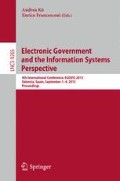Abstract
The take-up of the usage of public e-services in Hungary is slow, though a lot of efforts were exerted in order to accelerate the process. The paper points out barriers rooted in the traditional logic of access to public e-services in which clients are required to use the same e-authentication technique and way of electronic document exchange. We present a client-driven model that gives the freedom of choice to the client with respect to the e-authentication technique as well as the document exchange to be used, thereby eliminating these barriers. A simplified form of the model was enacted by the law and is now being implemented in Hungary.
Access this chapter
Tax calculation will be finalised at checkout
Purchases are for personal use only
References
European Commission, eGovernment in Hungary, Edition 16.0. https://joinup.ec.europa.eu/elibrary/factsheet/egovernment-hungary-april-2014-v160 (2014)
OECD e-Government Studies: Hungary 2007, OECD Publishing, Paris (2007). doi:10.1787/9789264030527-en
Harindranath, G.: ICT in a transition economy: the case of hungary. J. Global Inf. Technol. Manag. 11(4), 33–55 (2008). http://dx.doi.org/10.1080/1097198X.2008.10856478
Nemzeti Adó- és Vámhatóság. 2013 Yearbook of the National Tax and Customs Administration (in Hungarian) (2013). http://www.nav.gov.hu/nav/kiadvanyok/nav_vilaga
Csüllög, K., Varga, A.: A survey on mass perception of e-government services in Hungary, Information Society (1/2007) (2007)
Directorate General for Communications Networks, Content and Technology Delivering on the European Advantage? eGovernment Benchmark. Final Insight Report: May 2014 (2014). ISBN 978-92-79-38051-8
Hajnal, G., Kovács, E.: Government Windows: One Stop Shops For Administrative Services In Hungary (2014). http://www.cocops.eu/wp-content/uploads/2013/10/Hungary-CGov-Government-Windows.pdf
OECD, Public Governance Reviews. Hungary: Towards a Strategic State Approach (2015). http://www.oecd.org/publications/hungary-towards-a-strategic-state-approach-9789264213555-en.htm
Salvodelli, A., et al.: Understanding the e-government paradox: Learning from literature and practice on barriers to adoption. Gov. Inf. Q. 31, 63–71 (2014)
Aichholzer, G., Strauss, S.: Electronic identity management in e-Government 2.0: Exploring a system innovation exemplified by Austria. Inf. Polity 15(1–2), 139–152 (2010)
Marin, I., Audenhove, L.: The Belgian e-ID and its complex path to implementation and innovational change. Identity. Inf. Soc. 3(1), 27–41 (2010)
Vasconcelos, A., The Portuguese Interoperability Framework applied to the Portuguese Citizen Card Project. OECD Workshop on Digital Identity Management (IDM), May 9, 2007 (2007). http://www.oecd.org/dataoecd/36/9/38573902.pdf
Martens, T.: Electronic identity management in Estonia between market and state governance. Identity Inf. Soc. 3(1), 213–233 (2010)
Tejchman, J., Kozicki, J.: Introduction: conceptual framework and research design for a comparative analysis of national eID Management Systems in selected European countries. Identity Inf. Soc. 3, 1–2 (2010)
Nemzeti Adó- és Vámhatóság, Tájékoztató az adóügyek elektronikus úton történő intézéséhez. 32. számú információs füzet (2013). http://nav.gov.hu/nav/regiok/kiemeltadozok/aktualis/adougyek_32.html
Molnár, B., et al.: Identity-background checking: a solution, which Meets the requirements of privacy and personal data protection at identity management domain. SEFBIS Journal No.1, 22–32 (2006)
Shrivastava, S., Saquib, Z., P., G., Chomal, P.: Unique identity enabled service delivery through NSDG. In: Kő, A., Leitner, C., Leitold, H., Prosser, A. (eds.) EDEM 2012 and EGOVIS 2012. LNCS, vol. 7452, pp. 103–111. Springer, Heidelberg (2012)
Zwattendorfer, B., Zefferer, T., Tauber, A.: The prevalence of SAML within the european union. In: 8th International Conference on Web Information Systems and Technologies (WEBIST), pp. 571–576 (2012)
Author information
Authors and Affiliations
Corresponding author
Editor information
Editors and Affiliations
Rights and permissions
Copyright information
© 2015 Springer International Publishing Switzerland
About this paper
Cite this paper
Kiss, J.K., Kiss, P.J., Klimkó, G. (2015). Towards a Model of Client-Driven Access to Public e-Services. In: Kő, A., Francesconi, E. (eds) Electronic Government and the Information Systems Perspective. EGOVIS 2015. Lecture Notes in Computer Science, vol 9265. Springer, Cham. https://doi.org/10.1007/978-3-319-22389-6_9
Download citation
DOI: https://doi.org/10.1007/978-3-319-22389-6_9
Publisher Name: Springer, Cham
Print ISBN: 978-3-319-22388-9
Online ISBN: 978-3-319-22389-6
eBook Packages: Computer ScienceComputer Science (R0)

